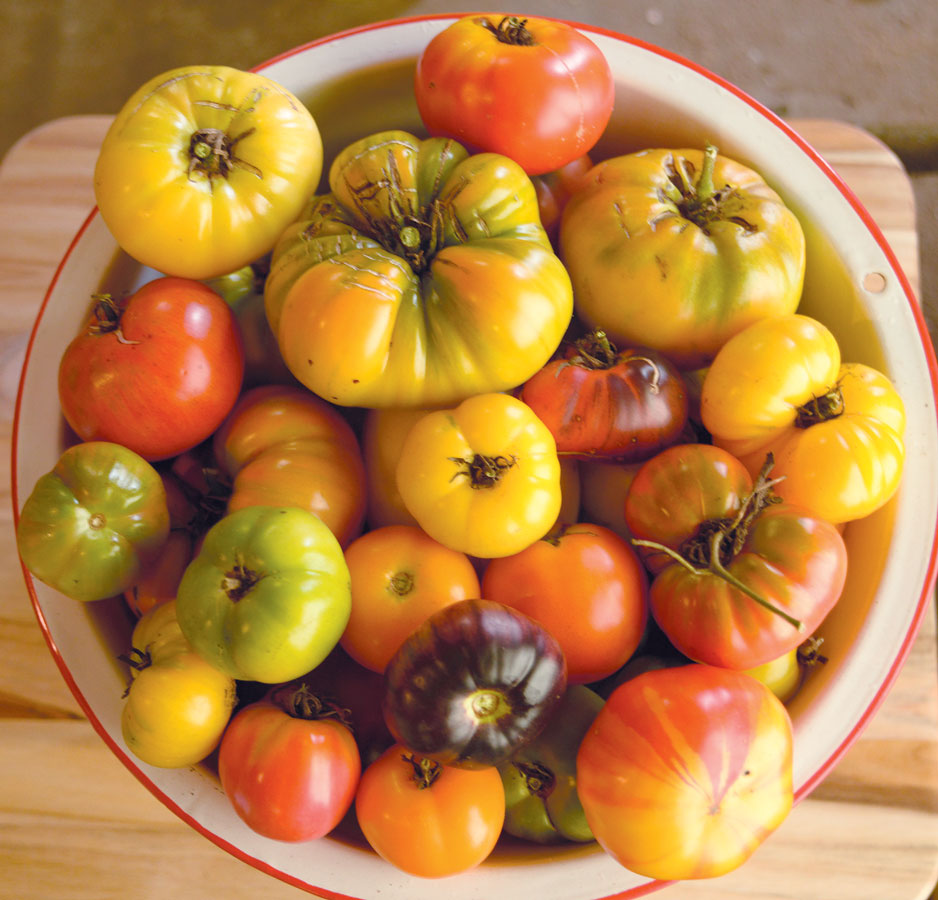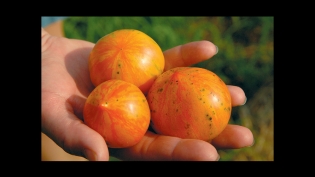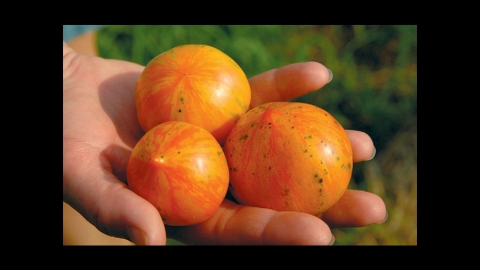Talking Tomatoes
‘Beefsteak’ is a relative term
If you’re looking for the largest variety of privately owned heirloom tomato seeds in Michigan (and arguably the world), you will find it in a farmhouse outside of Copemish. When two tomato powerhouses, Dean Slater and Marianne Jones, met, they had no idea they would eventually combine their seeds, resources and lives to create the huge collection.
“I’d been a fan of Mariseeds for years,” says Dean. “But the logo showed this little old woman, so I figured that was Marianne.” Dean was startled to meet the actual Marianne (definitely not a little old lady!) at a tomato conference a few years later. The two started talking tomatoes, and in 2012 Marianne moved herself, her seeds and eventually her tractor to Michigan.
PKS Heirlooms, started in 2001 by Mike Kessler and Dean Slater, has focused on heirlooms from the start. An heirloom tomato is one that has been grown for over 50 years, but “created heirlooms”— those made by crossing existing heirlooms—are becoming very popular.
Music brought Dean to Northern Michigan, but health issues forced him to leave his band, Wicked Savior. Faced with this life change, Mike, the band’s manager, asked Dean, “So what do you want to do with the rest of your life?” Dean had been growing a few tomatoes and thought that might be an enjoyable career, so Mike bought heirloom seeds and they started digging on 60 acres of family land.
While deer hunting on the land, Dean found a “wild” tomato that had been reseeding itself and producing fruit for years. He named this small yellow tomato after his mother and now Sweet Beverly is available from many seed sellers.
Marianna’s Heirloom Seeds, also known as Mariseeds, got its start down south in the early 1990s. Marianne Jones had 36 acres in Tennessee that came with an existing garden. “I started with the regular things like Early Girl and Big Boy, basically just the stuff you can get at any store. But then I read an article in Natural Gardener and it had pictures of all of these different types of tomatoes. They were purple and green and yellow and were all shapes and sizes. I was so excited I ordered 20 different kinds of seeds out of the back of that magazine.”
The seeds arrived and Marianne’s passion for tomatoes was born. Each year she would try new kinds of heirlooms and it didn’t take long before she figured that if she wanted to grow that many tomatoes, she had better figure out what to do with them.
In 1997 she began selling seeds and plants locally, then nationally and eventually worldwide. In her second year of business she had around 100 different types of seeds, and by the time she moved to Michigan in 2012, that number had exploded to 3,500.
“There is an argument that heirlooms are more susceptible to disease and harder to grow than hybrids, but that doesn’t make any sense,” says Marianne. “Why would people continue to grow and save these for generations if they weren’t spectacular? ‘Disease resistant’ varieties only give you a few days more time, and in my opinion are not worth it for the sacrifice in taste.”
Today PKS and Mariseeds sell seeds by mail, and plants and produce from their farm. Long-dormant cow pastures have been transformed with row upon row of homemade tomato cages. Hundreds of plants in the back fields use the “sprawl” growing method to produce a rainbow of fruit.
PKS is known for its variety and quality of many types of heirloom vegetables, used by chefs and restaurants throughout the Traverse City area. Executive Chef Matt Fitzke of the Riverside Inn in Leland has been working with PKS for three years.
“We get a large variety of seasonal vegetables from them, including the tomatoes, potatoes, peppers and a bunch of squash—there is even one named after me!” says Matt.
Indeed, the Fitzke-Siagkris, named after Matt and his sous-chef Peter Siagkris, is a combination of Hubbard and two other squashes. It has a bright orange flesh and Matt says it’s great for using in recipes—nice and dry with a delicious flavor. They use it with a fish dish where they grill the squash and serve it with panseared arctic char or salmon.
“PKS comes once or twice a week during the busy season and Dean is very enthusiastic and high energy,” says Matt. “It’s great to get the knowledge behind the vegetables we choose. We really try to use as much local food as possible, from the German butterball potatoes (they make the most amazing smashed potatoes) to the huge variety of heirloom tomatoes.”
Riverside Inn changes two to three menu items every few weeks to keep the menu seasonal and fresh.
The rest of the PKS customer list reads like a “who’s who” of the Traverse Area culinary scene, with each chef having their preferred varieties. Executive Chef Jim Morse, from the Boathouse Restaurant on Old Mission Peninsula, sits down with farmers each February to plan produce needs for the year. This is his third season working with PKS.
“We really like the menu and the season to speak for itself,” he says. “We grow our own food for the restaurant and then work with local farms to decide what varieties and quantities we anticipate needing. Dean is kind of a mad scientist with this stuff. He crosses for best flavor, best color—I tell him what we like and he makes crosses for us that have all the best quantities.”
In fact, Jim’s squash, the Kirkwood Morse, was created by open-pollination between four of the best lines of pie pumpkins. And while seed for the exclusive squash is available to everyone, PKS only provides the grown squash to the chef it is named after.
“The vegetables I get from PKS are so flavorful. I like to use them in simple dishes: heirloom tomatoes in a summer salad with burrata cheese; a simple squash soup for fall and the potatoes just roasted with a little sea salt.
“What I most appreciate is their honesty. Mike and Dean are working every day to give me a product that they are proud of and that is the best product for me to put in front of my customers,” says Jim.
When they are not delivering fresh vegetables to restaurants (home delivery also available for anyone who orders 20 pounds or more of produce), or tending the ever-growing garden, the PKS team is working on refining their products. “We have some tomatoes that grow to almost the size of volleyballs and lots that we are breeding on dwarf plants. We’ve got thousands of plants in the ground each year, and we’re always playing around with them. When we started, everyone thought tomatoes were round and red. It took a lot of free samples to educate people, but once you’ve tried an heirloom, you don’t go back. We’re working on long-lasting fruits, super-hot peppers, basically, if you can think of it, we’re probably trying it out here,” says Dean.
Growing the tomatoes, as well as a large variety of heirloom peppers, squash, beans, eggplants, pumpkins and potatoes, is a fulltime job for Dean and Marianne, and one that they feel passionate about. They are happy to share advice on growing, picking and eating. “Never prune heirlooms. Each leaf is a solar power generator for the plant, so you want as many there as you can get,” explains Dean.
“It isn’t true that some types of tomatoes have more acid than others—that’s all the same,” says Marianne. “The reason for the taste difference is that some cultivars have less sugar, which makes them taste more acidic.”
And they both stress that if you want a tomato with excellent flavor, never pick a variety that has “steak,” “girl” or “boy” in the name. Beefsteak is just a term for a large-size tomato, not an actual variety. The term has become synonymous with tomatoes that are round, red and all ripen at the same time—not with the best taste.
Jena Van Wagner is a tremendous advocate of local food. She writes about it, works with great clients to promote it and stands on a soapbox any chance she gets. Her husband and two children tolerate her tomato and compost addiction in Kingsley, Michigan. Contact her at Jena_Van@yahoo.com.
Mariseeds offers tomato and other heirloom seeds year-round at their website, Mariseeds.com.
PKS Heirlooms sells plants in the spring and produce in the summer and fall at the farm, located at 7485 N. 1 Rd. in Copemish. Visits to the farm by those interested in learning more about heirlooms and open pollination crossing are welcome by appointment, call 231-709-9866.







